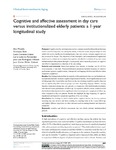Mostrar o rexistro simple do ítem
Cognitive and affective assessment in day care versus institutionalized elderly patients: a 1-year longitudinal study
| dc.contributor.author | Maseda, Ana | |
| dc.contributor.author | Balo García, Aránzazu | |
| dc.contributor.author | Lorenzo-López, Laura | |
| dc.contributor.author | Lodeiro-Fernández, Leire | |
| dc.contributor.author | Rodríguez-Villamil, José Luis | |
| dc.contributor.author | Millán-Calenti, José Carlos | |
| dc.date.accessioned | 2015-03-04T13:33:47Z | |
| dc.date.available | 2015-03-04T13:33:47Z | |
| dc.date.issued | 2014-06-05 | |
| dc.identifier.citation | Maseda A, Balo A, Lorenzo-López L, Lodeiro-Fernández L, Rodríguez-Villamil JL, Millán-Calenti JC. Cognitive and affective assessment in day care versus institutionalized elderly patients: a 1-year longitudinal study. Clin Interv Aging. 2014 Jun 5;9:887-94. | es_ES |
| dc.identifier.uri | http://hdl.handle.net/2183/14183 | |
| dc.description.abstract | [Abstract] Purpose: Cognitive decline and depression are two common mental health problems that may create a need for long-term care among the elderly. In the last decade, the percentage of older adults who receive health care in nursing homes, day care centers, or home support services has increased in Europe. The objectives of this descriptive and nonrandomized longitudinal study were to evaluate and to compare the cognitive and affective evolution of day care versus institutionalized older patients through a 1-year period, and to assess the presence of cognitive and affective impairment as a function of the care setting. Patients and methods: Ninety-four patients were assessed at baseline, and 63 (67.0%) were reassessed 1 year later. Neuropsychological assessment included measures of cognitive performance (general cognitive status, visuospatial, and language abilities) and affective status (depressive symptoms). Results: Our findings indicated that the majority of the participants (day care and institutionalized patients) had mild–moderate cognitive impairment at baseline, which significantly increased in both groups after 1-year follow-up. However, the rate of change in global cognitive function did not significantly differ between groups over time. Regarding language abilities, naming function maintained among day care patients in comparison with institutionalized patients, who showed worse performance at follow-up. As regards to affective status, results revealed that institutionalized patients had a significant reduction in depressive symptoms at follow-up, when compared to day care patients. Results also highlight the high frequency of cognitive impairment and depressive symptoms regardless of the care setting. Conclusion: Our findings revealed a similar global cognitive decline rate between patients receiving day care services and those residing in a nursing home at the 1-year follow-up, and slightly different trajectories in other outcomes such as naming function and depressive symptoms. | es_ES |
| dc.language.iso | eng | es_ES |
| dc.publisher | Dove Medical Press | es_ES |
| dc.relation.uri | http://dx.doi.org/10.1016/S0167-4943(00)00044-3 | |
| dc.rights | Creative Commons Attribution-Non Commercial 3.0 International License (CC-BY-NC 3.0) | es_ES |
| dc.rights.uri | http://creativecommons.org/licenses/by-nc/3.0/ | |
| dc.subject | Cognitive and affective assessment | es_ES |
| dc.subject | Day care elderly patients | es_ES |
| dc.subject | Institucionalized patients | es_ES |
| dc.title | Cognitive and affective assessment in day care versus institutionalized elderly patients: a 1-year longitudinal study | es_ES |
| dc.type | info:eu-repo/semantics/article | es_ES |
| dc.rights.access | info:eu-repo/semantics/openAccess | es_ES |
Ficheiros no ítem
Este ítem aparece na(s) seguinte(s) colección(s)
-
GI-GIGG - Artigos [114]






